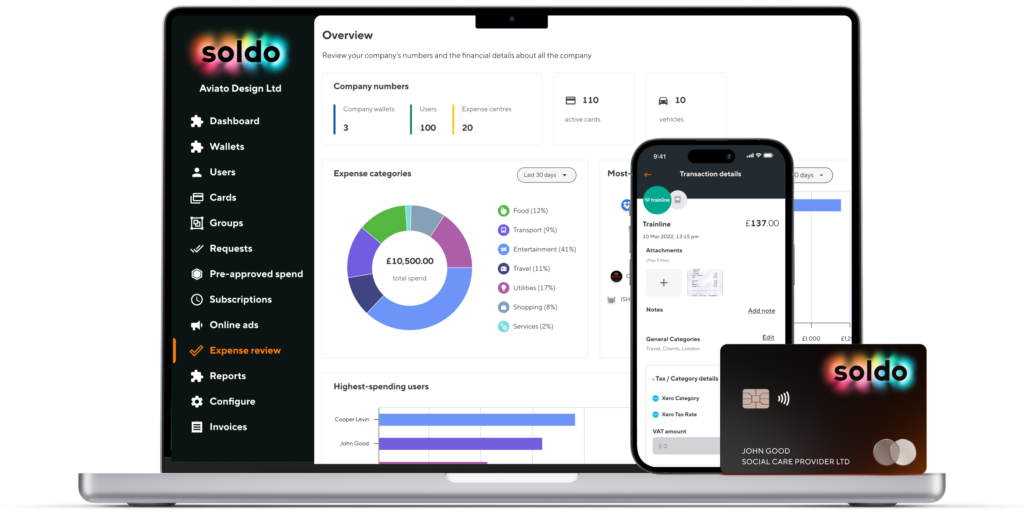Managing expenses for your team can be a significant administrative task that requires considerable time and resources. Luckily, several different software platforms exist to automate the process, creating efficiencies in the workplace and also providing data to report and analyse where expenses are occurring.
In this article, we provide an overview of expense management software and outline the key features to look for. We also provide you with 5 alternatives to Spendesk, one of the better-known platforms available.
What is Expense Management Software?
Expense management software enables companies to pay, track, and record costs incurred during their operations. The term’ expenses’ can include any costs associated with the process of generating revenue, but it is usually applied to any costs employees incur to perform their role.
An example of expenses is the travel and hospitality costs incurred when an employee visits a client and takes them out for dinner as part of an ongoing professional relationship.
Expenses are significant to a business because they directly impact profitability. Accurate tracking of expenses provides information that supports budgeting, planning for tax payments and financial decision-making for the future.
What Should You Look For In An Expense Management Tool?
If you are beginning a search for the best expense management tool, a good place to start is to consider your organisation’s structure, size, and financial goals. Understanding the details of your daily operations and the locations where the company operates is also essential.
Here are 10 key questions to consider when looking for an expense management tool:
How easy is it to use?
The software should have an intuitive interface that is easy to access, and getting to grips with the system should require minimal training for employees.
Does it allow employees to capture and upload receipts?
For accurate and up-to-date tracking, employees must be able to take a photo of their receipt and attach that record directly to the relevant transaction. Look for optical character recognition (OCR) to help with the automatic completion of data.
Can you customise the approval workflows?
Each company has their own processes, so being able to personalise the approvals with role-based permissions, multiple approval chains, and notifications is essential.
Are the functions related to managing expenses automated?
A sound expense management software system will categorise expenses as they occur, send reminders, approve reimbursements, and automatically flag any policy infringements.
Can you integrate the software with other applications?
Being able to integrate with other software, such as accounting, payroll, and HR applications, is essential to ensure that the information from your expense management software accurately feeds into the rest of your business. API access is also necessary to support custom integrations.
Is there a native mobile app or cloud-based access to the software?
Being able to access the expense management software when they are out and about is essential for more accurate tracking and paying of expenses. Some platforms have their own mobile apps, while others offer connections via their websites.
Does the software support multiple currencies and locations?
If your company operates internationally, it may be essential for you to be able to record and pay expenses in various currencies.
Are travel expenses included in the software?
Not every expense management tool can support travel expenses. If being able to track employee mileage, pay per diem travel policies, and integrate flight and hotel information are essential for your business, the software you choose should include these features.
Is there a good reporting function?
Being able to export reports on expenses, track trends and understand expenditure in real-time is a significant benefit of expense management software. While most systems provide rudimentary reporting, some also support the customisation of dashboards and analytics to deliver more detailed and specific reports.
Is the software secure and compliant?
Expense management software should keep an audit trail of all transactions to support tax compliance. It’s also essential that any employee data stored in the system meets GDPR requirements and is encrypted with role-based access so only those who need to use specific employee data can retrieve it.
Top 5 Alternatives to Spendesk
While Spendesk is a popular platform for small and medium-sized businesses looking for support with expense management, it’s not necessarily the best solution for all organisations. Users report issues scaling Spendesk as their business grows, a lack of reliability in how the system integrates with other applications, and unresponsive customer support. People also cite glitches in the virtual card system, with some transactions declined after initially being approved, which can create issues. For some users, there are still too many manual processes involved in the Spendesk system. For example, reimbursement is not an automatic process.
All these issues mean that exploring alternatives to Spendesk is a good idea to ensure that you are investing in the right platform for your business. Here, we have five alternative options to consider beyond Spendesk.
Spendesk Alternatives Comparison Chart
| Platform | Best For | Core Features | Integrations | Pricing | Drawback |
| Factorial | All-in-one support that includes HR, finance, and payroll | Expense tracking plus several HR functions | Open API, integrates with payroll, accounting and HR tools | Starts at £5.40 per user per month | Broader than just expense management |
| Pleo | Smart cards and automated expenses | Virtual and physical cards, real-time tracking of expenditure | Xero, QuickBooks, Sage | Starts at £9.50 per month for up to 3 users | Limited support beyond basic expenses tracking |
| Soldo | Large teams with multi-level controls on expenditure | Robust spend limits, audit trails and immediate control of expenditure | Xero, QuickBooks, Sage | Starts at £21 per month for three users | Not suitable for companies with fewer than 10 people |
| Rydoo | Global companies that support a travelling workforce | Travel expenses and global compliance | Travel booking tools | Starts at £7 per user per month | Higher price compared to other platforms |
| Zoho Expense | Small businesses on a budget | Basic expenses and mileage support | The rest of the Zoho Suite, plus accounting tools such as QuickBooks and Zero | Free plan for up to 3 users | No virtual or physical corporate cards as part of the platform |
1. Factorial: All-in-One Platform with Expense Management
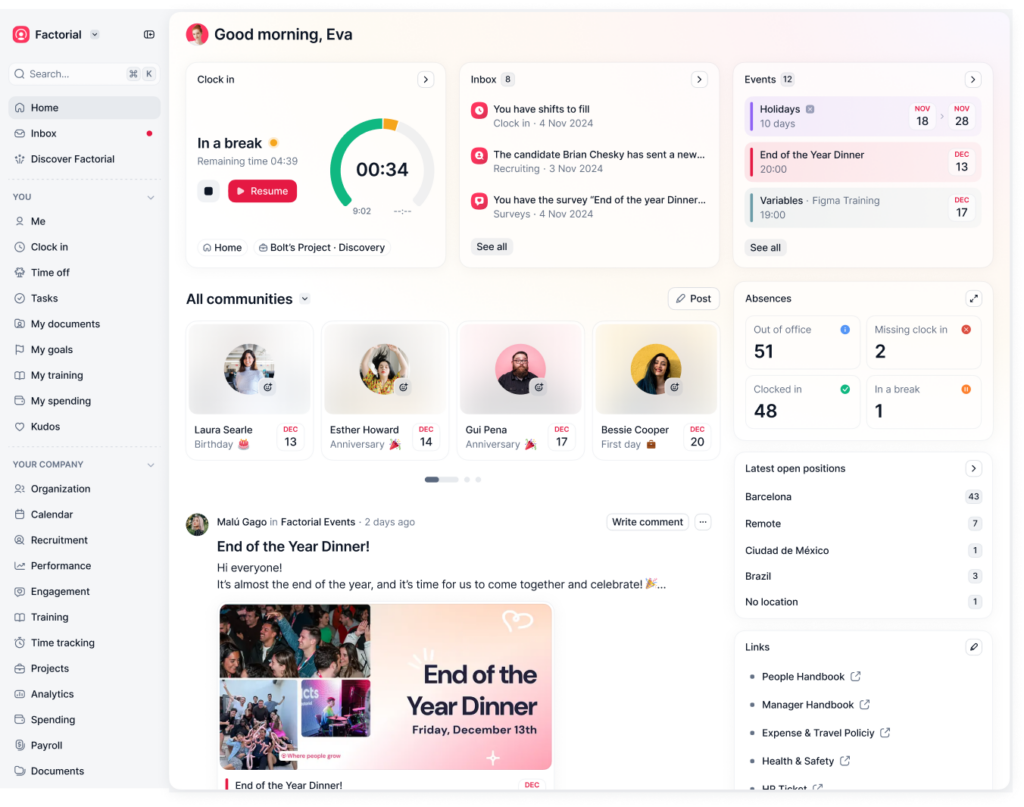
Factorial is a comprehensive business management platform that covers all your HR needs, including tracking, recording and paying expenses. The software seamlessly integrates several HR functions such as leave management, performance reviews, recruitment and onboarding, and financial tools, such as expense management software. Additionally, Factorial supports project and IT management, and procurement as part of its financial module. The ‘core’ pricing plan includes most of the financial functions required, such as reporting, expense reimbursement through payroll, and support for the entire payroll process. As a result, Factorial can support your financial needs without extra cost.
Financial Features
As well as the many HR functions that Factorial supports, it provides the following financial support:
- A native mobile app enables instant receipt uploads.
- Approval workflows with role-based permissions.
- Centralised dashboard and up-to-date analytics.
- Expenses information, time tracking and payroll data are all linked for individual employees.
- Open AI to support integrations with other applications.
- Expense cards (Factorial cards) to monitor employee spending.
Pros
- Includes OCR-based receipt scanning and auto-fill of expense data.
- Allows the implementation of personalised policies.
- Supports nearly 200 currencies.
- Integrates reimbursement of expenses into payroll.
Cons
- May include more features than necessary.
- Larger organisations require considerable set-up time.
- Does not solely focus on finance tools.
Pricing
- Includes a free trial.
- Prices start at £5.40 per month per user.
- Plans are available for various businesses and budgets, tailored to the HR needs of the organisation.
See why 13,000+ businesses chose Factorial to manage time, people, and money. → Get a demo
Pleo
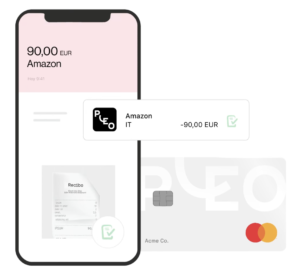
Pleo is a mobile-first, UK-based platform designed to be easy to use while employees are on the go. Its simple interface and low price point make it a strong alternative to the more expensive and more complex option of Spendesk. Pleo is popular among smaller businesses seeking a speedy setup which is why it makes such a great alternative to Spendesk.
Key Features
- Mobile app for uploading receipts with OCR technology
- Offers both virtual and physical company cards with a spending limit and cashback options.
- Integrates with applications such as Xero, Sage and QuickBooks.
- Provides real-time overviews of where expenditure is occurring.
Pros
- Suitable for small businesses.
- Easy-to-use interface.
- Includes an approvals process.
Cons
- Limited features beyond tracking expenses.
- Higher-tier pricing for additional features.
- Less support for invoice automation and batch processing.
Pricing
- Starter Plan is £9.50 per month for up to 3 users
- Essential Plan £45 per month
- Advanced Plan £99 per month
- Beyond Plan £179 per month
- Additional monthly fee to add extra users
Soldo
Soldo promotes itself as a tool for fair expenses without a spending free-for-all. Its system supports the quick and easy setup of expense management software while ensuring that appropriate controls are in place. Compared to Spendesk, Soldo is a strong alternative for small or mid-sized Europe-based organisations that need fast deployment with prepaid cards and robust expenditure controls.
Key Features
- Virtual and physical prepaid company credit cards with spending limits.
- OCR-enabled receipt upload functionality.
- Approval workflows with multiple users, categories and audit trails.
- Integrates with financial software such as Zero, QuickBooks and Sage.
- Reports available.
Pros
- Quick and easy to set up.
- Robust prepaid rules for expenditure.
- Seamlessly integrates with popular finance tools.
Cons
- The user interface is not as intuitive as other platforms.
- Not suitable for companies with fewer than 10 people.
- Limited reporting support unless you pay for Plus or Unlimited plans.
Pricing
- Standard plan £21 per month for three users, £7 each for additional users.
- Plus plan £33 per month for three users, £11 each for additional users.
- ‘Unlimited’ custom option available.
Rydoo
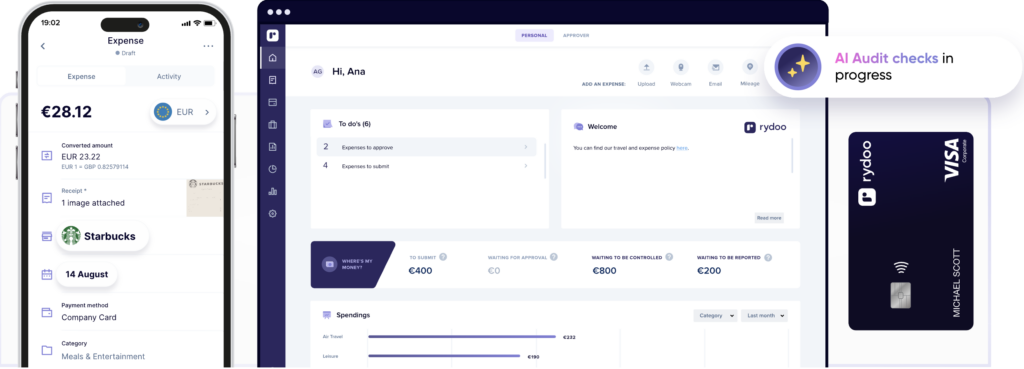
Another expense-only software solution, Rydoo is a platform designed to support workforces based in the field or who travel frequently. The platform utilises AI to automatically categorise, record, and intelligently report on where expenditures are occurring, and features a mobile app. Compared to Spendesk, Rydoo is a strong alternative if you need to support employees who travel frequently and manage a large number of expense receipts.
Key Features
- Supports travel expenses with per diem and mileage tracking, as well as booking support.
- OCR-enabled scanning and automated approvals.
- Covers over 150 currencies and supports global tax compliance requirements.
- ‘Smart Audit’ analyses expenditure and produces reports.
Pros
- Native mobile app with robust functionality.
- Tools linked with the OCR scanning function detect duplication or fraud.
- Corporate cards don’t require pre-funding.
Cons
- Set-up is considered complex for smaller companies.
- Higher price compared to competitors.
- Limited customisation options for reporting.
Pricing
- Online self-service options include Essentials at £7 per user per month and Pro at £9.50 per user per month.
- Two personalised options with custom pricing are the ‘Business’ and ‘Enterprise’ plans.
Zoho Expense
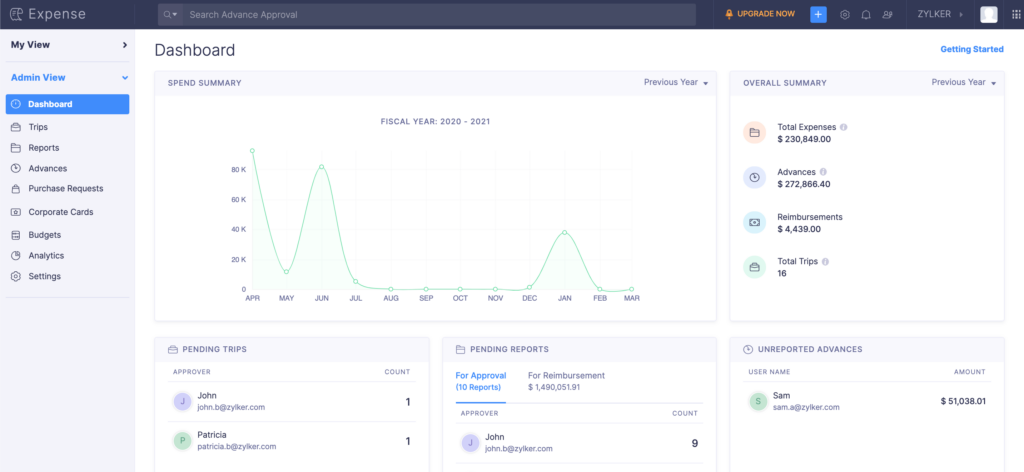
Zoho is a robust and comprehensive software solution that supports various business functions, including HR, project management, customer relations, and accounting. Zoho Expense is their travel and expense management solution, which offers features like receipt scanning, multiple users for approval processes, and tracking of mileage and per diem expenditure. It is a good alternative to Spendesk if you are looking for a cost-effective and scalable tool that is part of a bigger ecosystem of support.
Key Features
- Includes OCR-enabled scanning and tools to detect duplication and policy violations.
- Integrates with financial software such as QuickBooks and Zero.
- Zoho software also supports various financial functions, including P&L statements, balance sheets, and tax reporting.
- Mileage, per diem tracking and bookings are all supported for travel expenditure.
Pros
- Good value for money.
- Comprehensive support for the whole business.
- Easy to set up and start using.
Cons
- The platform does not include its own virtual or physical corporate cards.
- Limited reporting and analytics.
- Automation for invoices is basic.
Pricing
- Free plan available for up to 3 users
- Standard Plan £5 per month
- Premium Plan £7 per month
- Custom plan available for up to 100 users
The Best Spendesk Alternative for UK Employers in 2026
When it comes to choosing an expense management software as an alternative to Spendesk, there are many options to consider. Priorities vary for each organisation, and it’s a good idea to spend some time assessing exactly what you need before investing. For many businesses, it makes sense to invest in a platform that offers value for money and provides expense management support as part of a wider suite of functions.
Factorial is the best alternative for UK-based employers seeking a robust, comprehensive system that is flexible, agile, and scalable. Using Factorial’s system, you can track expenses based on projects, review employee spending, provide daily limits and automate the reimbursement process. But there’s much more to Factorial than this. The platform can help your business run more efficiently by bringing together data for HR, finance, and time and attendance in one place. That’s what makes Factorial such a strong alternative to Spendesk – all your core business functions, centralised in one unified platform.
Get started with Factorial today. Book a demo to get your free trial today!
The information presented on this page is based on publicly available sources and not limited to spendesk.com, zoho.com, rydoo.com, pleo.io, soldo.com, G2 public reviews, Capterra public reviews, and trustpilot public reviews. The comparisons between Factorial and other providers, are intended solely for the illustration of the respective software features, pricing and functionalities. All information regarding features, prices, and integrations may be subject to change without prior notice. Factorial assumes no liability for the accuracy, completeness, or timeliness of the information presented. We recommend contacting the respective providers directly to obtain the most accurate and up-to-date information. All legal regulations regarding spanish fair advertising and competition law are fully observed by us; if you have any concerns, please reach out to us. The comparisons presented do not constitute a final evaluation or recommendation for any provider, but serve solely as an informational source.

